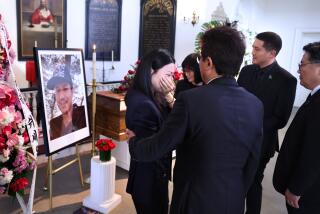Korean Riot Victims Still Devastated, Study Finds : Urban problems: Nearly a third of the families surveyed say they face financial ruin. They blame bureaucratic hurdles for delays in reopening businesses.
- Share via
Nearly one in three Korean-American victims of last year’s riots say their financial situation is so desperate that they are fearful of losing their homes, according to a survey released Thursday.
The study of 98 families by the Korean American Inter-Agency Council also found that almost half of the people who lost businesses have not been able to reopen because of bureaucratic hurdles involving government agencies and a combination of personal, health and financial reasons.
The findings, released at a Koreatown news conference, came four months after an earlier study that queried a larger group. The first survey, which questioned 1,539 of the 2,130 Korean-American riot victims, disclosed that more than half of them displayed symptoms of post-traumatic stress disorder and nearly half said that they felt hopeless about their future. Only three in 10 had reopened their businesses at that time.
Six bilingual workers from the consortium of 10 Korean-American community organizations interviewed the 98 families in the second survey in June and early July.
Despite the relatively small sample, council officials insisted that the findings accurately reflect the predicament of the broader group.
Discussing the survey, Yongbin Kim, deputy executive director of the Korean Youth and Community Center, said, “The public’s attention is so short that they think the riot was 15 months ago and everything is OK. This survey tells you a lot of people are continuing to suffer and if Los Angeles is going to rebuild itself, city officials have to take these people into consideration.”
One surprising finding was that 15% of college-age youngsters had dropped out of school because of the riots.
“It broke my heart to see my son stay out of school for a whole year to help the family,” said Y. S. Lee, adding that the most important thing to Korean parents is educating their young.
Lee said her family’s swap meet in South-Central Los Angeles was reopened in January but it is a struggle to keep it going.
“We are nervous all the time,” she said. “We are all taking tranquilizers to try to cope. We’ve had two car accidents since the riots.”
Lee complained that everybody in her family suffers from headaches and stomach ailments.
“I don’t know when we will recover, if ever,” she said.
In the study, other respondents complained of migraine headaches, ulcers, high blood pressure, heart conditions and diabetes. Almost 70% of the respondents reported that they were depressed.
“I lost my second store because I couldn’t pay make payments on my SBA loan,” said Susie Hur, whose Koreatown clothing store was destroyed in the riots. Last December, her clothing shop in San Pedro was burglarized twice, she said. She said she carried no insurance because she could not afford the premiums.
Hur said she asked the Small Business Administration for a postponement on her loan payment but her request was turned down, forcing her to go out of business.
“Now my home is in foreclosure. What else is left for me except to declare bankruptcy?” Hur sighed.
Sang-Chil Rhee, who lost a video business during the riots, likened the “bureaucratic red tape” he and other victims have encountered to a “second riot.”
“I think we should be given interest-free loans until we can get back on our feet. We lost everything through no fault of our own. Even when we try to rebuild, we can’t go back in because they won’t let us,” he said, referring to new city regulations requiring liquor store owners to go through public hearings before they can rebuild. “We are being victimized twice.”
Bong-Hwan Kim, co-chairman of the Inter-Agency Council, said if “Mayor Riordan is watching, we hope he pays particular attention to the victims who lost their livelihood through no fault of their own.”
Kim said a nine-month program funded by FEMA to assist riot victims in both Korean and English will end Aug. 4, leaving merchants with even fewer resources when they run into bureaucratic roadblocks.
More to Read
Sign up for Essential California
The most important California stories and recommendations in your inbox every morning.
You may occasionally receive promotional content from the Los Angeles Times.










